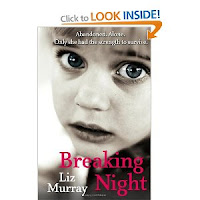Back in January last year, I promised I’d review this book. At last, here it is.
Liz Murray is a young, American woman with a Harvard
education, and a career as a motivational speaker. ‘Twas not always so; ‘born to a drug addicted father who was in
and out of prison, and an equally dependent mother who was in and out of mental
institutions, she seemed destined to become just another tragic
statistic,’ (from the jacket flap). This book is her story.
It is very well written; gripping and compelling (perhaps a
little longer than it needed to be, but that’s just a quibble).
I’m pleased to say that there is very little bad language in it, even
when quoting friends from life at its worst.
There’s no salacious scenes at all – just some hints about what was
going on. It is refreshing to find
someone not glorying in dirt and evil.
It’s refreshing too to read someone determined to take
responsibility. She sees clearly that,
however dark our situation, we are responsible for how we react to it – the
need to make ‘empowering choices.’ (As
I remember, she only lapses once from this, when she says that the addiction of
her parents was ‘not their fault’ when it is plain that they had made wrong
choices again and again when they had had no need to do so. But you can forgive a daughter that
unconditional love for her parents, surely!)
What I particularly love is that Liz does love her parents, and
cherishes their memory – even though it seems to me, an outside reader, that
there was very little to love and cherish.
So, young Liz found herself sleeping rough often,
increasingly dependent on friends who would house her for a night, or nights – and
increasingly fearful of the day of the day that it would stop.
'At what point would I become too much? When would they start saying no? this couldn’t go on forever. And just the thought of being in dire need
and having to, one day, hear my friends flat-out say no to my hunger and my
need for shelter – and to turn away from my desperation – well, the thought of
that rejections was just too much to deal with. I dreaded that moment of ‘no’ that I sensed was coming. What does it feel like, the moment someone
you love turns you down? I didn’t want
to find out.'
Getting to know a girl called Paige was a turning
point. Paige had been a runaway, but
now held down a job, had her own apartment – and pointed Liz to the way
out. After several rejections, Liz
enrolled at an ‘alternative high school’ in New York City – a school for anyone
who was motivated, with or without money.
There the hard work began, and the climb our of dependence.
Here she tells how the climb took not one decision, but
hundreds of day-by-day decisions that are empowering, rather than
disempowering. Early morning, cold and
surrounded by sleeping friends – with an hour’s subway ride to get to school –
the easy decision was to stay with them, warm, sleepy and – going nowhere. The empowering decision was to walk away,
get to school, and work. Years of such
empowering decisions took her first to Harvard, and then to more success as’ the founder and
director of Manifest Living, a company that provides a series of workshops that
empower adults to create the extraordinary things in their lives.’
What’s interesting about this video clip is the similarity –
and difference – to Biblical holiness.
Liz emphasises that it’s not a once-for-all decision, and neither is
holiness. She emphasises that there are
lots of pressures to hold us back – as there are with holiness. She knows and declares powerfully that
consistent movement in the same direction inevitably leads to real progress –
as with holiness. She is realistic
about the temptations from well-meaning friends to be less committed – as with
holiness. The two big differences, of
course: our goal is not our own prosperity, but pleasing him. And we have, within, the Holy Spirit,
driving us ever on and empowering us to make empowering changes.


